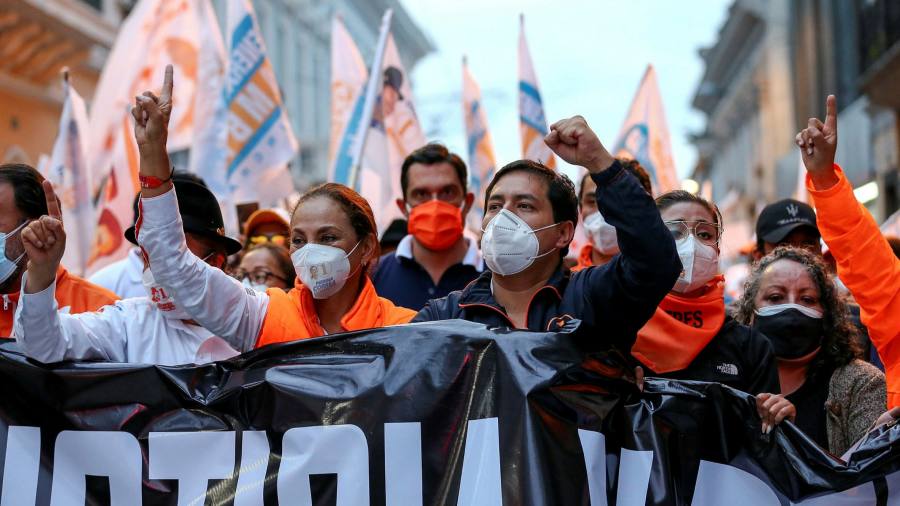[ad_1]
When Ecuadoreans cast their votes in next Sunday’s presidential election, they will face a stark choice.
The main leftwing candidate has promised to hand out $1,000 to a million families in a week, while on the right, a former banker wants to revive the stricken economy by wooing billions of dollars in foreign investment.
Other elections this year in Peru and Chile, and next year in Colombia, will also amount to referendums on competing economic ideologies as Latin America emerges from the shadow of the pandemic. There are strong signs unhappy citizens across the Andes could turn to populists as the pandemic exposes the failings of market-friendly policies.
“Voters are extremely angry and frustrated,†said Michael Shifter, president of the Inter-American Dialogue in Washington. “There is very strong pressure for greater attention to equality issues and a greater role for the state.â€Â
Polls show deep dissatisfaction with most of Latin America’s incumbent presidents and politicians, particularly those who have espoused market-friendly technocratic policies.

One former Latin American finance minister, who asked to remain anonymous, identified a common problem: technocrats had built institutions like central banks, banking supervision and finance ministries which delivered economic stability. But they had failed to provide high-quality public services and too often health and education had ended up being delivered for profit.
The worry now is that voters will throw out some of the economic positives, such as sound macro policies and increasingly credible institutions, along with the hated incumbents. That could mean a return to the free-spending populism of the past, which ran up huge debts and bent institutions to presidents’ wills.
The region was struggling even before coronavirus. Inadequate public health services, high labour informality and weak state capacity made it particularly vulnerable. Death tolls from Covid-19 are among the world’s highest and economic damage among the most severe.
Ecuador’s leader LenÃn Moreno, who is not running again, is one of the least popular leaders in the region. After he imposed drastic austerity measures last year to plug a hole in the budget, including liquidating the national post office, his approval ratings collapsed to single digits.
Luis Oganes, global head of emerging markets research at JPMorgan, said there was a risk across the Andean nations of populist candidates triumphing. “Covid is providing cover for bad ideas and bad policies that will dominate the next [election] cycle,†he said.
Ecuador’s voters are notoriously fickle but most surveys indicate that Andrés Arauz, a young economist and protégé of former leftist firebrand leader Rafael Correa, holds a lead over Guillermo Lasso, his main conservative rival.Â

Mr Arauz’s election website calls on visitors to register for the promised $1,000 per family handout. After choosing lump sum or instalment payments, voters are then invited to support his campaign.
“Should he win, it will be a demonstration of populism’s ongoing appeal at a time of great economic hardship,†said Cynthia Arnson, director of the Latin America programme at the Wilson Center, a think-tank.
“When deciding between putting food on the table and supporting representative democracy, the choice is pretty obvious for the average citizen.â€
In neighbouring Peru, voters will elect a new single-chamber parliament as well as a new president in April, effectively renewing the entire political leadership.Â
Peru had been one of Latin America’s best economic performers in recent years. But its impressive GDP growth, well-run finance ministry and respected central bank have not translated into citizen wellbeing.
A bungled lockdown last year crippled the economy but did not contain the virus. Peru’s death toll from coronavirus is now the highest in Latin America when adjusted for population size.
One-time emerging market darling Chile, which votes in November, has been plunged into unrest since a wave of riots engulfed it only months before the virus arrived, exposing deep citizen discontent at expensive, poor-quality public services and inadequate pensions.
As in Ecuador and Peru, the anger was directed at a ruling class which looked after itself but failed to deliver for ordinary citizens. Now, the country plans to draft a new constitution in the hope of correcting the flaws.
But amid growing public outrage, there is little time left for the technocrats to course correct while populist triumphs risk taking the region backwards.
“We can’t pretend that everything is fine and defend the status quo,†the former minister said. “It clearly isn’t fine. But that doesn’t mean destroying everything which has been achieved.â€
Â
[ad_2]
Source link






